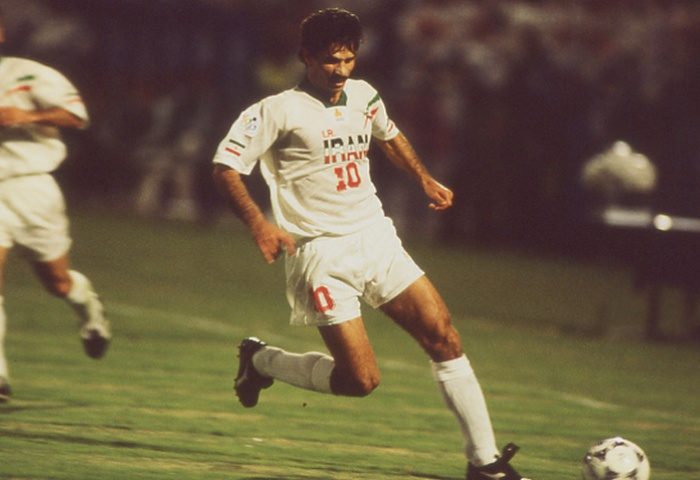AFC Asian Cup Archive: Ali Daei’s 1996 masterclass

AFC – KUALA LUMPUR, With March 28 and the opening fixtures in the final round of qualifying for the 2019 Asian Cup looming ever larger, join the-afc.com as we rewind to 1996 – a tournament that featured a stunning quarter-final performance by Ali Daei.
When Islamic Republic of Iran legend Ali Daei retired in 2007, he did so as the most prolific striker in the history of international football, but, as might be expected, it didn’t happen overnight.
Midway through 1996 Daei – by then already 27-years-old – had only scored seven of his eventual 109 goals for Iran, but the next six months would produce 22 international goals and culminate in one of the greatest individual performances in the history of Asian football.
Team Melli arrived at the 1996 AFC Asian Cup with a strong squad including Daei, who had bagged 12 goals in qualifying, as well as the precocious talents of Khodadad Azizi, Karim Bagheri and future star Mehdi Mahdavikia.
Despite a shaky start to the tournament, losing 2-1 to neighbours Iraq in their first match, Iran hit back with commanding wins over Thailand (3-1) and Saudi Arabia (3-0), with Daei scoring in all three of the Group B matches.
In Group A, and chasing their first AFC Asian Cup since 1960, Korea Republic were having a tougher time.
After a 1-1 draw against hosts United Arab Emirates in the tournament opener, the Taeguek Warriors rebounded with a 4-2 win over Indoneisa, In their final Group Stage match the Koreans suffered a 2-0 loss to a semi-final bound Kuwait, and, by the skin of their teeth, qualified for the Knockout Stage as one of the two highest ranked third-placed teams.
In the quarter-finals, two of Asian football’s major powers met under the beaming Emirati sun and it was Iran – undoubtedly the team in form – who nearly went ahead after only ten minutes when a superb Daei effort forced a smart near post save from Korea Republic goalkeeper Kim Byung-ji.
Less than a minute later however, Team Melli found themselves defensively exposed and a goal behind, Kim Do-hoon finishing off a move that saw the ball go from one end of the pitch to the other within twenty seconds. 1-0 Korea Republic.
Iran equalised on the half-hour mark, when a lofted corner kick found an unmarked Bagheri, whose powerful 18-yard header clipped a Korean foot, and deflected into the net.
Iran’s hard work was to be undone however three minutes later as their defence failed to deal with a simple, speculative cross, presenting future AFC Champions League winning coach Shin Tae-yong with the opportunity to volley home from 12 yards.
When the teams emerged for the second half, Iran were immediately on the front foot. Azizi had a shot blocked on the goal line within three minutes, and Bagheri should have doubled his tally just moments later.
Such was Team Melli’s pressure that it came as no surprise when 1996 Asian Footballer of the Year Azizi finally equalised in the 52nd minute after latching on to Daei’s measured pass.
At 2-2, and with elimination looming large for the loser, the game became a dramatic, high-quality affair between two of Asia’s powers, but Ali Daei was about to turn the contest from entertaining to unforgettable with 23 minutes of magic.
In the 66th minute, and with Iran’s talented playmakers growing in confidence after repeated raids at the Korean penalty area, the Daei show began.
Daei received the ball 35 yards from goal, brushed off a defender, dribbled into the penalty area and hammered the ball into the far corner from 15 yards, before wheeling away in delight and being mobbed by teammates and coaching staff.
Daei had scored for the fourth consecutive match in the tournament and put his country in front for the first time in the quarter-final. He was, though, just getting started.
Ten minutes later Daei scored one of the greatest goals in the history of the AFC Asian Cup, when he perfectly controlled a 30 yard cross with the inside of his right foot, before instantly shifting his body into a position where he could hammer a half volley into the top right-hand corner from just outside the box.
It was a remarkable, unstoppable goal, and one that realistically took the game away from Korea Republic.
Daei’s hat-trick was complete in the 83rd minute when the Koreans, desperate to close the two goal gap and stay in the tournament, pushed men forward, leaving the outstanding Azizi far too much room with which to set up Daei for a simple eight-yard tap in.
Azizi was at it again just before the final whistle when he was brought down by goalkeeper Kim. It was left to Daei to stroke home his fourth goal in just 23 minutes from the penalty spot.
Remarkably, after trailing at half-time, Iran had won the match 6-2, marking an historic and memorable win on Asia’s biggest stage. For Korea Republic, the AFC Asian Cup silverware drought dating back to 1960 continued.
Iran’s tournament would though end in disappointment, losing painfully in the semi-final on penalties after a 0-0 draw with the same Saudi side they had convincingly beaten in the Group Stage. But despite its bitter postscript, Daei’s performance stands out as one of historic greatness.
He isn’t the only player to have scored four goals in one AFC Asian Cup match (Behtash Fariba, Ismaeel Abdullatif and Hamza Al Dardour are the others), but the stage of the competition, the level of the opponent and the sheer quality of the goals puts his display, arguably, in a league of its own.
Daei would go on to score 78 more international goals, and achieve countless records throughout his sparkling 149-cap career, but few performances stick in the memory like that amazing night in Dubai.




